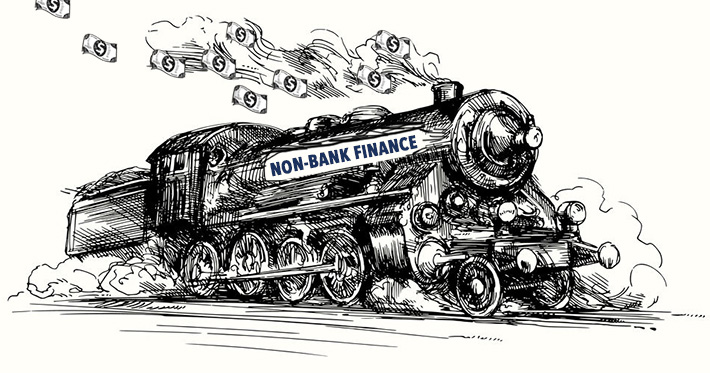The Biggest Expansion Period of Our Lifetime? The Non-Bank Finance Industry Says Full Steam Ahead
 Erez Stamler, Managing Director of Fresh Funding, said that the events of the past year has been an up and down ride, from the initial shutdown shock to rushes in demand. Now that the world is back, those that survived are here to stay and need capital to grow.
Erez Stamler, Managing Director of Fresh Funding, said that the events of the past year has been an up and down ride, from the initial shutdown shock to rushes in demand. Now that the world is back, those that survived are here to stay and need capital to grow.
“At first the system was in shock, then a phase where we saw a strong spike in submissions [where] the owners were probably looking for some sort of PPP-type solution, and that was not available by us,” Stamler said. “Going into 2022 we believe there’s a lot of demand out there. A lot of businesses have demonstrated growth during Covid and hopefully will continue that into 2022. As far as we can see right now, we’re going strong this year for sure.”
Alex Vasilakos, who tracks online interest in alt finance as the director of marketing for Finance Marketing Group, said there had been an increase in online searches for non-bank financing solutions in the past year because banks weren’t sure how the pandemic would pan out.
“We are back in the office, and we are seeing a large uptick in digital advertising since Covid, and it is continuing to increase,” Vasilakos said in an email. “I am seeing and predicting that people will be leveraging more online sources for financing than they have in the past.”
Amotz Segal, a startup co-founder of Edge Funder, said that if the Covid spikes and black swan events are over, there is no limit to demand, and the hybrid model is here to stay. Edge Funder uses lead generation and AI underwriting to make SMB deal-making easier, Segal said.
“I think nobody’s really bullish enough, I think we’re facing the beginning of the biggest expansion period of our lifetime,” Segal said. “Our team based in New York City will hopefully gradually go back to the office this fall. That being said, I don’t think that we will ever see a one-hundred percent office-space environment. I think what the pandemic did is accelerated a trend that already began of people working from home, working remotely, and not having to attend the office daily.”
Segal has grounds to be bullish: Edge was just acquired by Yes Lender after only a year of development.
 James Lee, CEO and co-founder of Julius Technologies, said that people had definitely gotten a feel for remote work, but virtual does not replace in-person communication. Julius is a startup that creates cost-effective back-end infrastructure for fintechs, building efficient data analytics for credit underwriting.
James Lee, CEO and co-founder of Julius Technologies, said that people had definitely gotten a feel for remote work, but virtual does not replace in-person communication. Julius is a startup that creates cost-effective back-end infrastructure for fintechs, building efficient data analytics for credit underwriting.
“We will see some shift. People got a taste of what it’s like to work from home; the hybrid model is a possibility in the short term,” Lee said. “In the long term we’ll see if Covid comes back in the fall with people working closely together. Hybrid works, but face-to-face time is irreplaceable and very difficult to replace in a virtual sense.”
Lee said that in-person interaction is vital for networking, mentorship, and even random, spur-of-the-moment conversations that bring a team together. Lee recently completed the Techstars incubator program fully virtually. Everything but launch day was virtual in a process that is usually hands-on.
Some firms are back in the office full time. Samuel Yakubov, director of ISO Relations at Maverick Funding, said he was already working in the office in June and had high hopes for 2022.
Tyler Deters, president and CEO of Paradigm Equipment Finance in Utah, said his business was back indoors and on track.
 “We are optimistic for the future,” Deters said. “Our staff has all returned to the office, and we are full steam ahead.”
“We are optimistic for the future,” Deters said. “Our staff has all returned to the office, and we are full steam ahead.”
Joe Lustberg from Upwise Capital couldn’t agree more and said his team had been working in the office through the shutdown. Lustberg is confident that the post-pandemic world will be great for business, and Upwise has been doing well servicing PPP, equipment and trucking financing, and niche cannabis industry funding. Upwise also took advantage of the dip in real estate to snag an office in Manhattan and “never looked back.”
“We made sure that everybody was vaccinated, and before the vaccination was available we were still in the office. We were getting tested monthly and my guys had the option to work from home,” Lustberg said. “To be honest, most of them want to be around the company culture, the show floor. It’s much easier for them to walk in my office and ask me a question than FaceTime. It’s good New York is coming back.”
Six or seven months ago, it might have been a market full of PPP loans, but MCA is coming back strong, Lustberg said. With government funds exhausted, he said even firms that had never taken an advance before are looking for funding.
Steven Hunter would agree the industry is back. As a consultant that works best coaching underwriting teams in person, however, the work from the home model has been a drag. He said hybrid may work for relaxed work environments, but to get ahead, in-person is the way it has always been and always will be.
“I think the fact that we have proven we can, in most situations, work remotely has made [funding shops] think: ‘well you know airfare, hotel, meals and Ubers.. you know it adds up.’ So, I think I think a lot of people are going to be cost-sensitive to travel in a way they weren’t before,” Hunter said. “But if you want to make it in this industry as a startup funder, and you want ISOs to give you deals, you cannot do that by the phone and you cannot do that via Zoom call. You have got to show respect for the good shops.”
Hunter said in the actual MCA business, you don’t win deals by calling them 100 times. You get deals from the best of the best by selling face to face.
“You get deals from [top brokers] by putting your ass on a plane and flying into LaGuardia, taking a cab to their office and camping out there for three days, and talking to them looking them in the eye and saying this is what I’m going to do for you,” Hunter said. “Sales is always going to be boots on the ground. You got to put people out there.”
Last modified: July 8, 2021Kevin Travers was a Reporter at deBanked.































